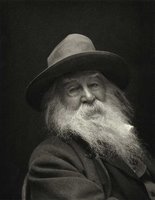 Walt Whitman born 31 May 1819 (d. 1892)
Walt Whitman born 31 May 1819 (d. 1892)Walter Whitman was an American poet, essayist, journalist, and humanist. Whitman is among the most influential poets in the American canon, often called the father of free verse. His work was very controversial in its time, particularly his poetry collection Leaves of Grass, which was described as obscene for its overt sexuality.
Born on Long Island, Whitman worked as a journalist, a teacher, a government clerk, and a volunteer nurse during the American Civil War in addition to publishing his poetry. Early in his career, he also produced a temperance novel, Franklin Evans (1842). Whitman's major work, Leaves of Grass, was first published in 1855 with his own money. The work was an attempt at reaching out to the common person with an American epic. He continued expanding and revising it until his death in 1892. After a stroke towards the end of his life, he moved to Camden, New Jersey where his health further declined. He died at age 72 and his funeral became a public event.
 Whitman's sexuality is sometimes disputed, although often assumed to be bisexual based on his poetry. The concept of heterosexual and homosexual personalities was invented in 1868, and it was not widely promoted until Whitman was an old man. Whitman's poetry depicts love and sexuality in a more earthy, individualistic way common in American culture before the 'medicalisation' of sexuality in the late 1800s. Though Leaves of Grass was often labelled pornographic or obscene, only one critic remarked on its author's presumed sexual activity: in a November 1855 review, Rufus Wilmot Griswold suggested Whitman was guilty of 'that horrible sin not to be mentioned among Christians'. Whitman had intense friendships with many men throughout his life.
Whitman's sexuality is sometimes disputed, although often assumed to be bisexual based on his poetry. The concept of heterosexual and homosexual personalities was invented in 1868, and it was not widely promoted until Whitman was an old man. Whitman's poetry depicts love and sexuality in a more earthy, individualistic way common in American culture before the 'medicalisation' of sexuality in the late 1800s. Though Leaves of Grass was often labelled pornographic or obscene, only one critic remarked on its author's presumed sexual activity: in a November 1855 review, Rufus Wilmot Griswold suggested Whitman was guilty of 'that horrible sin not to be mentioned among Christians'. Whitman had intense friendships with many men throughout his life.Some biographers have claimed that he may not have actually engaged in sexual relationships with men, while others cite letters, journal entries and other sources which they claim as proof of the sexual nature of some of his relationships.
Biographer David S. Reynolds described a man named Peter Doyle as being the most likely candidate for the love of Whitman's life. Doyle was a bus conductor whom he met around 1866. They were inseparable for several years. Interviewed in 1895, Doyle said: 'We were familiar at once — I put my hand on his knee — we understood. He did not get out at the end of the trip — in fact went all the way back with me.'
A more direct second-hand account comes from Oscar Wilde. Wilde met Whitman in America in 1882, and wrote to the homosexual rights activist George Cecil Ives that there was 'no doubt' about the great American poet's sexual orientation — 'I have the kiss of Walt Whitman still on my lips,' he boasted. The only explicit description of Whitman's sexual activities is second hand. In 1924 Edward Carpenter, then an old man, described an erotic encounter he had had in his youth with Whitman to Gavin Arthur, who recorded it in detail in his journal. Late in his life, when Whitman was asked outright if his series of Calamus poems were homosexual, he chose not to respond.
There is also some evidence that Whitman may have had sexual relationships with women. He had a romantic friendship with a New York actress named Ellen Grey in the spring of 1862, but it is not known whether or not it was also sexual. He still had a photo of her decades later when he moved to Camden and referred to her as 'an old sweetheart of mine'. In a letter dated August 21, 1890 he claimed, 'I have had six children - two are dead'. This claim has never been corroborated. Toward the end of his life, he often told stories of previous girlfriends and sweethearts and denied an allegation from the New York Herald that he had 'never had a love affair'.
In any case, Whitman is one of the first truly working-class poets and an iconic figure in gay literature.